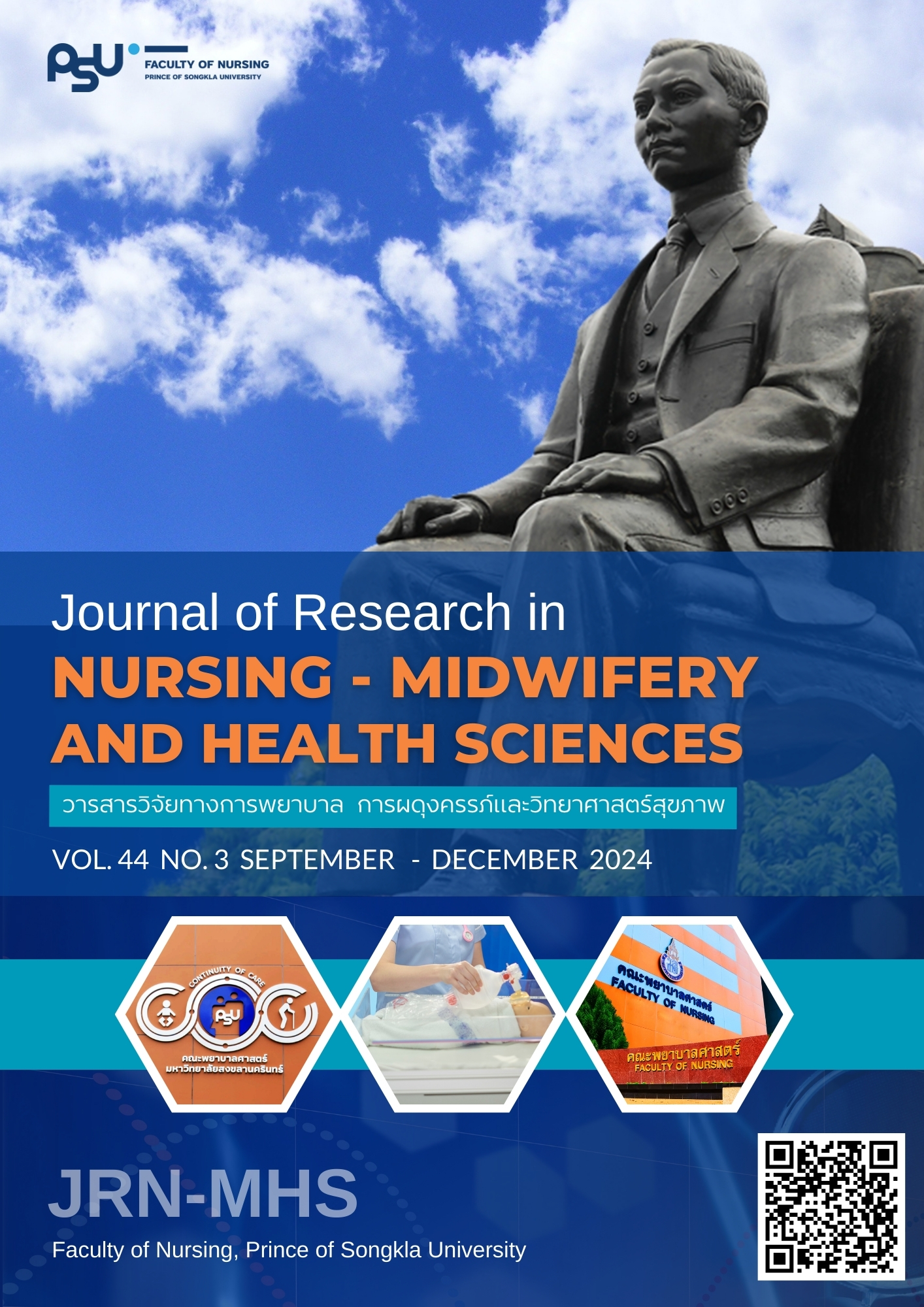โปรแกรมการเตรียมความพร้อมในการจัดการอาการ กลุ่มอาการทางเดินอาหารและความวิตกกังวล ในผู้ป่วยมะเร็งเต้านมที่ได้รับยาเคมีบำบัด: การทบทวนวรรณกรรม
Main Article Content
บทคัดย่อ
บทนำ: บทความวิชาการนี้ มีวัตถุประสงค์เพื่อนำเสนอและอภิปรายโปรแกรมการเตรียมความพร้อมผู้ป่วยมะเร็งเต้านมที่ได้รับยาเคมีบำบัดเพื่อลดอาการกลุ่มทางเดินอาหารและความวิตกกังวล โดยได้สืบค้นงานฐานข้อมูล ได้แก่ ThaiJO, Scopus, Pubmed และ EBSCO host ระหว่างปี ค.ศ. 2017–2023 คำสำคัญที่ใช้ในการสืบค้น ได้แก่ “ผู้ป่วยมะเร็งเต้านม” และ “ยาเคมีบำบัด” และ “โปรแกรมเตรียมความพร้อม” และ “กลุ่มอาการทางเดินอาหาร” และ “คลื่นไส้อาเจียน” และ “เยื่อบุช่องปากอักเสบ” และ “ความวิตกกังวล”and “breast cancer patient” and “chemotherapy” and “preparing program” and “gastrointestinal symptom cluster” and “nausea and vomiting” and “mucositis” and “anxiety” และได้คัดเลือกงานวิจัยที่เกี่ยวข้องได้ทั้งหมด 10 เรื่อง ทำการวิเคราะห์และพบว่า แนวคิดที่ใช้เป็นกรอบในการสร้างโปรแกรม มี 2 แนวคิด ได้แก่ 1) การดูแลตนเองของโอเร็ม (self-care theory) และ 2) การจัดการอาการ (symptom management theory) กิจกรรมการดูแลในโปรแกรม ประกอบด้วย การเตรียมความพร้อมก่อนได้รับยาเคมีบำบัด เน้นที่การจัดการอาการต่างๆที่จะเกิดขึ้นจากการได้รับยาเคมีบำบัดทั้งทางร่างกายและจิตใจ การให้ความรู้ในการปฏิบัติตน รูปแบบของกิจกรรมในการจัดการอาการต่างๆแบบไม่ใช้ยา และมีการติดตามทางโทรศัพท์ ระยะเวลาในการจัดกิจกรรม ครั้งละ 10–50 นาที ระยะเวลาตลอดโปรแกรมอยู่ในช่วง 1 วัน ถึง 3 เดือน ผลโปรแกรมพบว่า ทางด้านร่างกาย ระดับความถี่และความรุนแรงของคลื่นไส้อาเจียน เบื่ออาหาร และเยื่อบุช่องปากอักเสบลดลง ทางด้านจิตใจ ระดับความวิตกกังวลลดลง สรุป: โปรแกรมเหล่านี้สามารถนำไปใช้ในคลินิกเพื่อเตรียมความพร้อมผู้ป่วยโดยการให้ความรู้ในเรื่องการจัดการอาการต่าง ๆ ที่จะเกิดขึ้นจากการได้รับยาเคมีบำบัดทั้งทางร่างกาย
Article Details

อนุญาตภายใต้เงื่อนไข Creative Commons Attribution-NonCommercial-NoDerivatives 4.0 International License.
เอกสารอ้างอิง
World Health Organization. Estimates number of new cases in 2022 [Internet]. Lyon: World Health Organization; 2022 [cited 2024 Apr 27]. Available from: https://gco.iarc.fr/today/data/factsheets/cancers/39-All-cancers-fact-sheet.pdf?fbclid=IwAR1tI3r2LHo0uLBBqcSHi3VV71FbI85bhTFOYWRIT-teV97Zsp1owjcOCwc
National Cancer Institute.Cancer in Thailand Vol.X, 2016-2018 [Internet]. Bangkok: National Cancer Institute; 2022 [cited 2024 Apr 20]. Available from: https://www.nci.go.th/e_book/cit_x/index.html
Jongkhetkit W, Promkaew P, Sumdang D. Gastrointestinal and fatigue symptom cluster management in patients with breast cancer receiving chemotherapy. MJSBH. 2019; 34(2): 217-30. Thai.
Ocharoenrat P, Yenbutra P, Prasert W, et al. Breast cancer. 1 st ed. Bangkok: BKKMEDJ; 2019. Thai.
Laoitthi P, Parainyanitikul N. Breast cancer: Epidemiology, prevention and screening recommendations. Chula Med J. 2016; 60(5): 497-507. Thai.
National Cancer Institute. Breast cancer treatment (adult) patient version [Internet]. Bangkok: National Cancer Institute; 2017 [cited 2024 Apr 20]. Available from: https://www.cancer.gov/types/breast/patient/breast-treatment-pdq
Suttiwanich S, Khampiew A. Comparison of nausea and vomiting among patients whose receiving antiemesis drug and antiemesis drug with ginger in cancer patients receiving AC and FAC formulations, Lopburi Cancer Hospital. J DMS. 2020; 45(4): 162-6. Thai.
Korpunsilp S, Pongmesa T. Quality of life of breast cancer women during chemotherapy with fluorouracil, doxorubicin and cyclophosphamide (FAC) regimen. Songkla Med J. 2017; 35(4): 373-84. Thai.
Potarin W, Saengthong W, Chaiyasit Y, et al. The role of nurses for promoting nutrition in cancer patients receiving chemotherapy. JMND. 2021; 8(9): 131-43. Thai.
Harris CS, Kober KM, et al. Symptom clusters in patients receiving chemotherapy: A systematic review. BMJ supportive & palliative care. 2022; 12(1): 10-21. doi: 10.1136/bmjspcare-2021-003325.
Jindakul P, Namvongprom A, Pakdevong N. Effectiveness of the educative-supportive program on self care ability, perceived intensity of side effects of chemotherapy and anxiety among patients with early breast cancer under-going adjuvant chemotherapy. Thai Cancer J. 2018; 38(3): 105-16. Thai.
Karomprat A, Chaichan P, Santawesuk U, et al. Symptoms, symptom management and outcome in cancer patients undergoing chemotherapy. Srinagarind Med J. 2017; 32(4): 326-31. Thai.
Roozegar MA, Nourmohammadi H, Havasian M, et al. Evaluation of oral and dental complications caused by cyclophosphamide in patients with breast cancer in the Shahid-Mostafa Hospital, Ilam, 2019. RJPTh. 2022;15(12):5517-20. doi: 10.52711/0974-360X.2022.00931.
National Comprehensive Cancer Network. NCCN clinical practice guidelines in oncology (NCCN guidelines®): Antiemesis, version 2.2024 - September 27, 2024 [Internet]. Pennsylvania, PA: National Comprehensive Cancer Network; 2024 [cited 2024 Oct 16]. Available from: https://www.nccn.org/guidelines/category_1
Jamali J, Dayo A, Memon N, et al. Assessment of patient’s response about adverse drug reactions receiving AC (adriamycin, cyclophosphamide) therapy: A survey research. J Pharm Res Int. 2021; 33(26A): 8-13. doi: 10.9734/jpri/2021/v33i26A31467.
Nakamura ZM, Deal AM, Nyrop KA, et al. Serial assessment of depression and anxiety by patients and providers in women receiving chemotherapy for early breast cancer. Oncologist. 2021; 26(2): 147-56. doi: 10.1002/onco.13528.
Polit D, Beck C. Generating and assessing evidence for nursing practice. 11 th ed. Philadelphia, PA: Lippincott; 2021.
Page MJ, McKenzie JE, Bossuyt PM, et al. The PRISMA 2020 statement: An updated guideline for reporting systematic reviews. BMJ. 2021; 372: n71. doi:10.1136/bmj.n71.
Handa S, Okuyama H, Yamamoto H, et al. Effectiveness of a smartphone application as a support tool for patients undergoing breast cancer chemotherapy: A randomized controlled trial. Clin Breast Cancer. 2020; 20(3): 201-8. doi: 10.1016/j.clbc.2020.01.004.
Soliman HM, Eltantawy A, El-Kurdy R. The effect of progressive muscle relaxation training on chemotherapy-induced nausea, vomiting and anxiety in Egyptian breast cancer women: A randomized controlled trial. JNEP. 2022; 12(4): 1. doi: 10.5430/jnep.v12n4p1.
Mahboobeh P, Sahar S, Seyed R, et al. The effect of music therapy on chemotherapy-induced nausea and vomiting in women with breast cancer. Indian Journal of Cancer. 2023; 60(1): 87-91. doi: 10.4103/ijc.IJC_535_19.
Araújo RV, Fernandes AFC, Campelo RCV, et al. Effect of Raja yoga meditation on the distress and anxiety levels of women with breast cancer. Religions. 2021; 12(8): 590. doi: 10.3390/rel12080590.
Juartika W. The effect of drinking cold water on nausea and vomiting among patient with post-chemotherapy breast cancer. JPNS. 2022; 1(3): 74-85. doi: 10.55048/jpns.v1i3.15.
ArbabiSarjou A, Khamar M, Sasanpour P, et al. The effect of self-care training on the severity of oral mucositis in breast cancer patients undergoing chemotherapy. Med Surg Nurs J. 2021; 10(4). doi: 10.5812/msnj.123386.
Mazraeh E, Sadighi S, Manifar S, et al. Assessment of thyme honey oral gel for the prevention of adriamycin and cyclophosphamide chemotherapy-induced oral mucositis in patients with breast cancer. Support Care Cancer. 2023; 31(8): 497. doi: 10.1007/s00520-023-07943-9.
Chinda M, Jaturapatporn D, Kirshen AJ, et al. Reliability and validity of a Thai version of the Edmonton Symptom Assessment Scale (ESAS-Thai). J Pain Symptom Manage. 2011; 42(6): 954-60. doi: 10.1016/j.jpainsymman.2011.02.020.
Kim TH, Choi BM, Chin JH, et al. The reliability and validity of the Rhodes index of nausea, vomiting and retching in postoperative nausea and vomiting. Korean J Anesthesiol. 2007; 52(6): S59-65. doi: 10.4097/kjae.2007.52.6.S59.
Natethong T, Hanucharumkul S, Rattamatharathorn V. The effects of ice-chips in the prevention and relief of oral mucositis in cancer patients receiving chemotherapy. Rama Nurs J. 2000; 6(3): 183-92. Thai.
Bjelland I, Dahl AA, Haug TT, et al. The validity of the hospital anxiety and depression Scale: An updated literature review. J Psychosom Res. 2002; 52(2): 69-77. doi: 10.1016/s0022-3999(01)00296-3.


